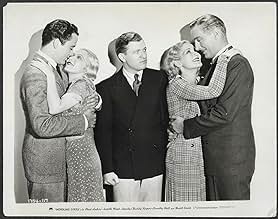Füge eine Handlung in deiner Sprache hinzuTwo sisters, May, older, naive, and June, younger and worldly, arrive in New York straight from the country and settle down in a boarding house. Their search for jobs leads them to find beau... Alles lesenTwo sisters, May, older, naive, and June, younger and worldly, arrive in New York straight from the country and settle down in a boarding house. Their search for jobs leads them to find beaus and romantic trouble.Two sisters, May, older, naive, and June, younger and worldly, arrive in New York straight from the country and settle down in a boarding house. Their search for jobs leads them to find beaus and romantic trouble.
Fotos
- Bit
- (Nicht genannt)
- Verne
- (Nicht genannt)
- Elsie's Boyfriend
- (Nicht genannt)
- Carrie
- (Nicht genannt)
- Ellen
- (Nicht genannt)
- Boyd's Butler
- (Nicht genannt)
- Frieda
- (Nicht genannt)
- Singer with Megaphone
- (Nicht genannt)
Handlung
WUSSTEST DU SCHON:
- WissenswertesThe original play, "Blind Mice" by Vera Caspary and Winifred Lenihan, premiered on Broadway at the Times Square Theatre on October 15th, 1930, and ran for a mere 14 performances. The opening night cast included Betty Breckenridge, Claiborne Foster, Hallie Manning, Gloria Shea (billed as Olive Shea) and Geraldine Wall. Unlike the film, the play has an all-female cast and takes place entirely within one room of the Rolfe House, the women's hostel where the film opens. The play was itself a reworking of Caspary's novel "Music in the Street" published by Grosset & Dunlap in December, 1929.
- Zitate
Mae Thorpe: [about June] Don't think she's conceited because she talks big Miss Johnson. She's just young.
Although this film has a screenplay so full of holes that almost nothing the characters do makes sense in relation to what they have previously done or will do, it is still a basically likable movie, because most of the characters in it are likable, if, as in the case of those played by Judith Wood and Dorothy Hall, fairly dizzy if not downright dopey. Wood is really quite good most of the time (given the 1931 requirements for voice projection and naturalness of delivery), and if Hall's voice is the kind that, in a different context, would make sandpaper feel like velvet, she, too, gets her character across. Neither of these actresses went anywhere (indeed, this was Hall's last film), but it seems to me that Wood might have stood a chance if handled properly. Everybody else in the film - Lukas (always a charming actor, even when playing villains), Erwin (maybe the most underrated comic leading man of this early period), and to a lesser extent Rogers (not terrible, but somewhat vacuous), and all the girls at the rooming house they inhabit, are good.
But what makes the film jell even as much as it does is Arzner's direction of somewhat inferior material. She uses the camera beautifully, even in scenes that wouldn't seem to require anything in the way of special concern, and there are a couple of montages that would do credit to directors of considerable superior reputations. In other words (and real movie lovers will know exactly what I mean), the film evidences a certain amount of real directorial care in its execution. The purported "lesbian" element in the early part of the film is, I think, seen to exist where it may not, probably because Arzner was known to be gay. But the early scenes which show the girls dancing with each other at home are not really very lesbian in nature, since 1) there are only girls in the rooming house, and if they want to dance, who else would they dance with?, and 2) it may be forgotten that lots of very straight women used to dance with each other at parties and the like right up into the 1960s, usually because their boy friends or husbands were lousy dancers or just didn't want to engage in Terpsichorean endeavors (my mother, aunt, some early girl friends at high school and birthday parties, etc. used to do so all the time, and nobody even thought of such an ulterior motive!). If you don't believe me, just watch some of the old Dick Clark afternoon teenage dance shows of the 1950s.
Anyway, an enjoyable little movie, one that will not put Arzner up there with John Ford or William Wyler, but one which she could have pointed to with a modicum of pride.
- joe-pearce-1
- 29. Aug. 2015
- Permalink
Top-Auswahl
Details
- Laufzeit1 Stunde 17 Minuten
- Farbe
- Seitenverhältnis
- 1.20 : 1
Zu dieser Seite beitragen

































